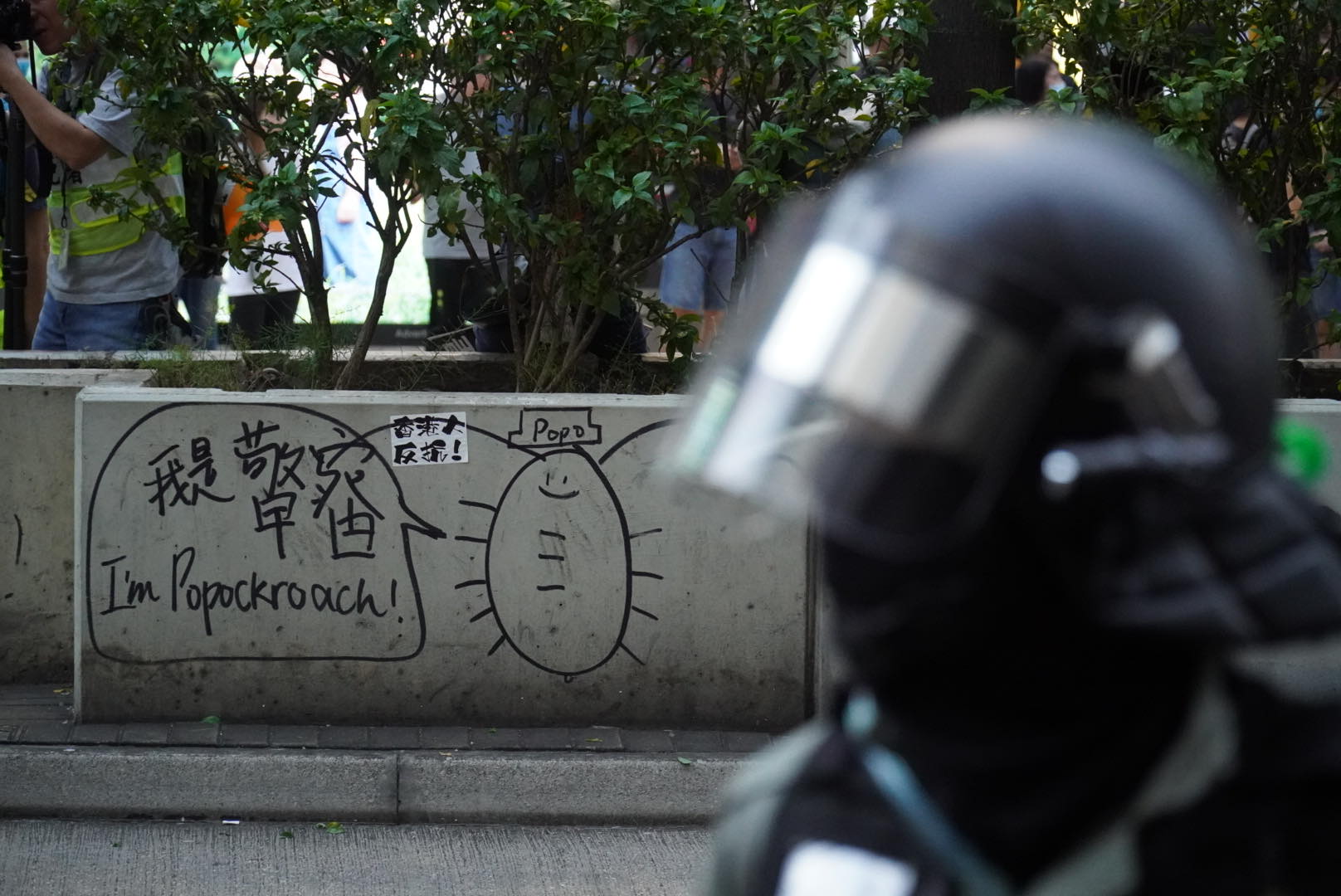
Why are Hong Kongers always deceived by the Pan-Democrats and the government in their struggle? A century ago, the exaltation of youth, children and emotional sentiments were what had created communism, the Cultural Revolution and Hong Kong’s “kamikaze” social activism.
Hong Kong protesters would engage in baby-talk with slangs such as “popo” (police), “hardy hard hard” (hardliner protesters), “baby/babies” (fellow demonstrators), “doggies” (police); employing comical drawings of cats, dogs and Pepe the Frog to disseminate their resistance manifesto; and singing the song “Glory to Hong Kong” in a kindergarten/playgroup style fashion whilst believing that to be an act of revolution. The Chinese communist party’s fourth plenary session of the 19th CPC Central Committee concluded in Beijing on the 31st of October, 2019, wherein Xi Jinping employed language that is the demonic child of the Cultural Revolution, as well as having the slogan “remember our initial intent, keeping in mind our mission” as their conference theme. The word “initial intent” was a term used during when Buddhism came to the Sino region during the Jin Dynasty (A.D. 266-420) that was echoed by the “Child-like Heart-Mind Principle” from during the later Ming Dynasty. Hong Kong’s Pan-Democrats, in their perpetual democratic struggle, also talk of “remember initial aspiration” that is highly synonymous with the Chinese communist party’s political tone. A party of revolutionaries are not monasticists, so when revolutionaries talk of “initial intent”, are they urging people to join them in escaping the trials of reincarnation and be enlightened to Buddha-hood?
In the Sino-translation of the Avatamsaka Sutra from the Jin Dynastic era (A.D. 266-420), it is written “remember your aspiration and you will find accomplishment” and “aspiration is the beginning and enlightenment is conclusion”, from which Gan Bao from the Jin dynastic era (A.D. 266-420) first cited it in Anecdotes of Spirits and Immortals: “since it is incompatible with our original intent, we here do part”. So in Buddhism, “original intent” (or initial aspiration) was meant to be used to show repentance and remorse, but in the hands of politicians, it is something to be betrayed. In the Commentary of Zuo: the 25th year of the Duke Xiang of Qi is written: “be cautious of the start and be respectful of the finish, in the end you shan’t be troubled”. In the 64th chapter of the Tao Te Ching, Lao Tzu said: “People usually fail when they are on the verge of success. So give as much care to the end as to the beginning; then there will be no failure.” Therefore, when dealing in politics one should see things through from beginning to the end, and not resorting to talks of “initial aspirations” in the hope of asking the crowd for forgiveness after having committed mistakes along the way.
The worship of childhood innocence in Hong Kong’s social activism, as well as the Chinese communists’ call to “remember our initial aspiration”, both originated from romantic literature and thought trends that came to the Sino regions from Europe in the modern times. China during the May-Fourth Movement advocated for the written vernacular, the country side, the peasantry, the young, trash heap of the spiritual, honesty of the ignorant, the noble savage, etc., all these were the vestigial residue of Romanticism from the West that made it into China through songs and poetry. Socialism, this outrageous set of philosophies having entered into China on the back of romantic sentiments, has enslaved countless youths. The veneration of youth, praising the emotional, emphasising suffering – these are but the symptoms of depression that is romanticism, which relied on sickness and disability in order to garner sympathies and to exert appeal. And yet, revolution in China had relied upon last wills, sickness, blindness, and disabilities as well as life-and-death for its publicity.
Greta Thunberg, the young Swedish female environmentalist recently exalted in the West, in her are embodied ideas of world harmony and environmental protectionism, the adoration of childhood innocence and the image of the Virgin’s maternal instincts; she is the grand accomplishment of contemporary romanticism. Romanticism is not socialism, whereby the former is a critique of and reaction against industrial societies, not a means to an end; its viewpoint and approach are very influential to a rapidly industrialising Hong Kong, thus its impact has been profound and tenacious. It has been a century since the May-Fourth Movement in 1919, and yet the reverence for the young, childhood innocence and emotional impulsiveness that it had is like a spell that has been sweetly haunting the collective soul of the Hong Kong people.
It is said that the child is father to the adult, or the child is the father of the man. Perhaps, people should have a read of the poem titled “My Heart Leaps Up”, written in 1802 by William Wordsorth, an English Romantic poet, in order to understand the textual origin of the veneration of childhood innocence.
My Heart Leaps Up
My heart leaps up when I behold
A rainbow in the sky:
So was it when my life began;
So is it now I am a man;
So be it when I shall grow old,
Or let me die!
The Child is father of the Man;
And I could wish my days to be
Bound each to each by natural piety.
The rainbow here hailed from the biblical myth of the Flood and Noah’s Ark from the Old Testament, whereby Yahweh (Jehovah) sealed a promise with Noah with a rainbow. This poem is likening the promises made between one’s initial aspirations as a child and one’s entire life to the testament made between God and Noah, that it would never be subjected to the corruption of the soul.
After the 1997 Transfer of Sovereignty, the Chinese communist party has been poisoning the education system in Hong Kong, baby snatching as it were, whereby indoctrination in patriotism begins in childhood such as the flag-raising ceremony and learning to march in the Chinese fashion. These in addition to baby formula that the Americans formulated for rapid mental growth in babies, along with education professionals expert in the American system within the Education Department urging for multiple-intelligence learning and learning portfolios, as well as playing the violin, orienteering, mathematical olympiad, etc. There is the Children’s Council, the Youth Development Commission and even a building has been dedicated to the Hong Kong Federation of Youth Groups. Yet, after being made to mature before their time, these youths could not find their romantic live style in their families, neighbourhoods, schools and workplace, so they look to politics for their romance. Leftards would leave out the harsh reality behind life on a farm and turn it to anarchist commune and the green-organic lifestyle; turning on-the-spot thinking on a battlefield that requires disciplined obedience to a small group discussions like that of peer support groups and the “together we rise, together we fall” hive mentality. Later on, Joshua Wong came onto the scene and the “sacred child” of social activism was finally created, now children in their teens are now wearing masks and going out onto the streets calling for revolution.
The pro-communist Pan-Democrats, leftards and pseudo-HK independence advocates – as well as the myriad of corrupted media outlets – they all made out what should have been a constitutional protection movement into a “youth movement” or even a “student movement”. The yamen runners (i.e. cops) especially targeted teenagers (the youngest one being only 11 yrs old) for the press to take photos of, in order to lower the movement’s age bracket so that it would become one where “innocent children and students sacrifice themselves for the adults”, whereby requiring the adults to vindicate and mollycoddle them. How is this modus operandi similar to that of the June Fourth democracy movement last century? Even though June-Fourth has yet to happen in Hong Kong, yet on the 14th November, 2019, when students from the Chinese University of Hong Kong blockaded Tolo Highway with the intention to motivate people to go on strike and the yamen runners making a show of trying to take No. 2 Bridge, the leftards publicised that “June-Fourth Massacre 2.0” would soon happen in Hong Kong. Naturally, “June Fourth Massacre 2.0” in Hong Kong didn’t happen thanks to little ol’ Wan Chin, as he had already persuaded them to retreat and so nothing happened.
Wan Chin do not speak of original intentions, nor does he exalt youths; he talks of Meng Tzu’s sincerity, which is conscience.
(Editor’s note: this article was published on the 76th printed edition of Passion Times. The subscription link for the printed edition of Passion Times is http://www.passiontimes.hk/4.0/regform.php)